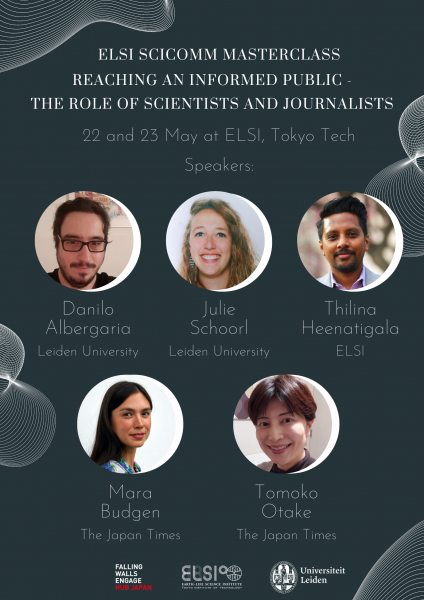
The ELSI SciComm Masterclass on the role of scientists and journalists in reaching an informed public will be held in two sessions on 22 and 23 May 2024. Experts from science, science communication, and journalism will present media engagement practices, the effect of news coverage on science, examples from the field in interviews and opinion expressions, and a variety of writing styles with hands-on practical.
The masterclass is organised by ELSI and Falling Walls Engage Hub Japan, in cooperation with Leiden University (The Netherlands) and The Japan Times. The masterclass welcome research scientists, graduate students, PIOs, and science communicators.
Dates: 22 May 16:00-18:00 and 23 May 14:00-16:00
Venue: Mishima Hall and Agora, ELSI
Registration: https://forms.gle/Rc6K2ondNf31PBfN7
Schedule:
Wednesday, 22 May: 16:00-18:00
16:00-16:15: Introduction and Objectives
16:15-16:45: Values, Theories, Frameworks
16:45-17:00: What went wrong in the Digital Era?
17:00-18:00: From academic writing to feature writing
Thursday, 23 May: 14:00-16:00
14:00-14:15: Engaging with journalists
14:15-14:25: Ask-a-Journalist
14:25-14:40: Writing an opinion piece
14:40-14:50: Ask-a-Journalist
14:50-16:00: Feature writing exercise
Speakers:
Thilina Heenatigala (he/him) is the Director of Communications and Specially Appointed Assistant Professor at Earth-Life Science Institute (ELSI) in Tokyo. He leads the outreach team, coordinates science communication projects, and teaches the science communication course at ELSI. His research interests are public engagement evaluation, science & society strategies at research institutions, astrobiology communication, and decolonising science.
Julie Schoorl is a lecturer at the Science Communication & Society Department at Leiden University (The Netherlands). During her studies and research in clinical neuropsychology, Julie developed a keen interest in teaching and communicating scientific results to audiences outside the academic bubble. She therefore took on several teaching positions within the academic environment at the Psychology department of the University of Amsterdam as well as the Leiden University Medical Center. In her current position at the Science Communication and Society department she teaches the MSc course Science Journalism to students from various natural sciences backgrounds and supervises MSc students during their science communication internships and research on mental health communication.
Danilo Albergaria is a postdoctoral researcher at the Astronomy & Society Group at Leiden University (The Netherlands), researching how astrobiology is being portrayed in the media. Dr. Albergaria has a diverse background as a teacher (in Brazil), science journalist, and a PhD in Philosophy of Science. His approach to science and society is to think, inquire, write, talk, and share.
Tomoko Otake is a reporter at The Japan Times. A native of Nara Prefecture, she has an M.A. in journalism from the University of Montana. After working as a reporter and editor at the English-language paper for over 20 years, she joined the University of Tokyo’s international communications team in 2018. She wrote and edited research features for the university’s online and print media. In 2022, she returned to the JT as a senior writer and has since been covering health and science research and policy topics.
Mara Budgen is the Opinion Editor at The Japan Times, coordinating the daily publication of commentary and analysis by experts and thought leaders in Japan’s foremost English-language newspaper. Previously, she was a freelance journalist specialising in sustainability and sociopolitical issues and Editor-in-Chief of sustainability news website LifeGate.com.
